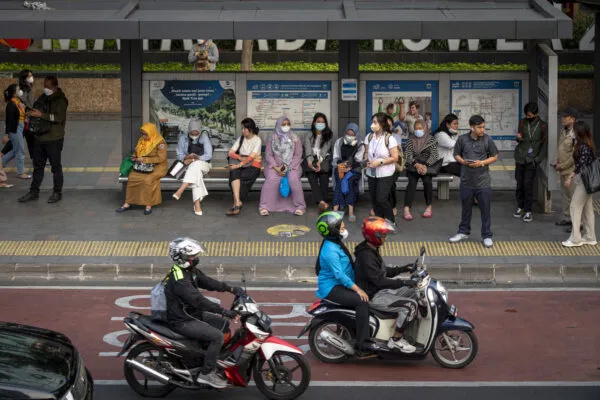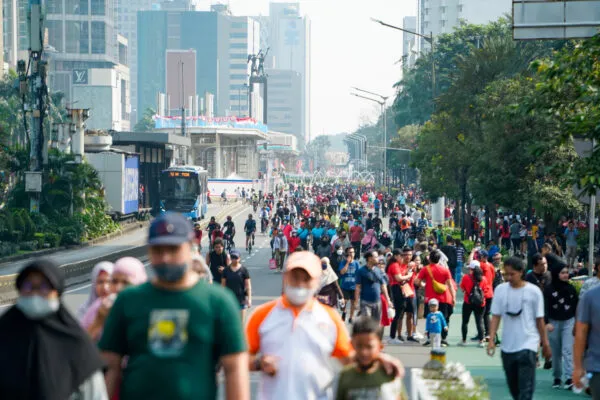Last week saw significant progress on air pollution at the Spring Meetings of the World Bank Group and International Monetary Fund. We’ve rounded up the highlights for the clean air movement, and areas where there are still opportunities for more action.
$1 billion in financial guarantees for clean air
The World Bank’s Multilateral Investment Guarantee Agency (MIGA) has pledged to $1 billion in financial guarantees to de-risk air quality projects. MIGA provides political risk insurance and credit enhancement to promote cross-border investment in low- and middle-income countries.
Guarantees provide an extra layer of protection for investors and can help overcome a wide range of barriers related to political, credit and counterparty risks, by enhancing the creditworthiness of otherwise risky investments. They also reduce the costs of capital – one of the major barriers for mobilising private investments.
MIGA has already used guarantees successfully for air quality projects. In 2022, MIGA approved a €17 million political risk insurance for the Zrenjanin Wastewater Treatment Plant in Serbia. In 2023, a € 20.8 million political risk insurance was also approved by MIGA’s board for a Bus Rapid Transit (BRT) in Dakar, expected to reduce air pollution in the city.
This welcome new pledge will help drive forward more air quality financing. Alongside this, we need to see increased grants and concessional lending from multilateral development banks and bilateral donors, to ensure that all countries have financing to tackle air pollution.
“Everyone knows it can and should be done”: Bank representatives at clean air side event
The World Bank hosted a side event on ‘Clean Air for a Liveable Planet’, bringing together civil society and multi-lateral bank officials committed to pushing forward action on air pollution.
Do not believe it when somebody tells you there is no money for air quality. The same countries that say they have no money are putting huge amounts into fossil fuel subsidies.
Juergen Voegele, Vice-President for Sustainable Development at the World Bank, at the Clean Air for a Liveable Planet event
Helen Clark, co-chair of the Our Common Air commission, highlighted the imperative to recognise clean air as an economic asset, as air pollution costs 6% of global GDP in health damages alone each year. She also urged development banks and the wider development finance community to develop clear, shared metrics, so that air quality improvements are tracked, encouraged, and publicised across investment portfolios.
Our CEO, Jane Burston, called for a holistic approach to scaling up financing globally, including smarter use of existing financial means to implement proven solutions that deliver major economic, social and health benefits. In this way, multilateral development banks can catalyse more funding from governments, other international development funders and private investors for air quality projects.
To tackle air pollution, we need a new vision for partnerships, acting in the interests of everyone. We must recognise we have a collective responsibility to provide affordable, sustainable solutions across the world.
Jane Burston
Other financial commitments
The World Bank also signed a $416 million loan to Turkey for industrial emissions abatement, which will have strong benefits for air quality. The World Bank will also lend Poland a further €250 million to finance the government’s “Clean Air” programme, which provides subsidies for households to upgrade to cleaner heating systems and improve insulation.
The World Bank already has a $4 billion pipeline of air quality projects, said Juergen Voegele, Vice-President for Sustainable Development, and is ready to do more. “We will have a much more deliberate and focused lens on whether our decisions can benefit air quality,” said Voegele.
Opportunities for more action on air pollution
The Spring Meetings also focused on the bank’s International Development Association (IDA) replenishment, which will take place later this year, and on its new corporate scorecard. Unfortunately, air quality isn’t currently one of the 22 indicators in the new corporate scorecard, nor does it feature in the pillars of the IDA policy framework.
An air quality indicator in the corporate scorecard would encourage greater action on air quality across sectors and recognise the multiple co-benefits of clean air for health, climate, environment and economy. And air quality should be part of the IDA framework.
Given IDA’s focus on the lowest-income countries, a focus on air quality is crucial, as poorer countries and more marginalised communities experience inequitable exposure to and disproportionate impact of air pollution.


